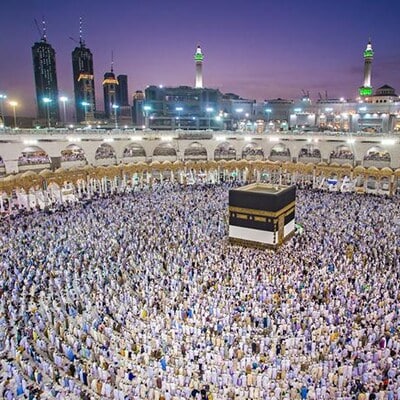Saudi Arabia said Sunday that more than 1,300 people have died during the Hajj pilgrimage this year, with heat stress and unauthorized travel the main causes, accounting for more than 80 percent of the deaths.
“The health system has dealt with a large number of heatstroke cases this year, some of whom are still receiving treatment. Unfortunately, the death toll has reached 1,301,” the Saudi Arabian government reported in its first official data release.
Click here to connect with us on WhatsApp
What is behind the deaths during the Hajj pilgrimage?
A Saudi government statement noted that 83 percent of those who died were pilgrims who had traveled without proper permits and had walked for long periods in direct sunlight without adequate shelter or comfort.
Among the dead were elderly people and people with chronic illnesses, and all of their family members have now been identified.
Extreme heat, which reached a record 52 degrees Celsius (125 degrees Fahrenheit) in Mecca, has been cited as a major factor in the high number of deaths and injuries reported this year. Further compounding these issues are unauthorized pilgrims who do not have the necessary permits (which cost thousands of dollars a trip) to legally access Mecca. These unauthorized pilgrims typically travel without organized amenities such as air-conditioned buses and adequate supplies of water and food.
The Saudi government also said many travels were unauthorized, delaying the official death toll and complicating the identification process. Despite initial difficulties, the statement assured that proper procedures had been followed for identification, burials and the issuance of death certificates.
Eyewitness account of tragedy during Hajj pilgrimage
Eyewitness accounts described pilgrims in dire conditions passing by bodies lying unconscious and wrapped in white cloth.
“On my way back, I saw many pilgrims who had died. Almost every few hundred metres, a body covered with ihram was lying there. [white fabric] “It's fabric,” Ahmed, 44, from Indonesia, told CNN.
“Whenever locals or certain organisations distribute water, pilgrims immediately flock to it,” he added, saying he had not seen a single medical worker or ambulance along the route.
Egypt cracks down on 'illegal' Hajj tours amid rising deaths
Meanwhile, Egypt has taken steps to crack down on illegal pilgrimages, announcing plans to revoke the licenses of 16 Hajj travel agencies that facilitated unauthorised trips to Mecca. The decision comes amid fears that hundreds of Egyptians may be among the dead, with reports saying the death toll is higher than officially reported.
The Egyptian government's move came after a cabinet meeting revealed irregularities in the way some tourism operators operated, including issuing false visas and failing to provide proper accommodation and heat protection.
The official Egyptian death toll is reported as 31. But Reuters and other sources have estimated the death toll during the pilgrimage at 500 to 600, and the death toll could be significantly higher.
Challenges and mourning
At the meeting, Prime Minister Mostafa Madbouly offered condolences to the affected families and promised necessary assistance in light of the tragic events during this year's Hajj, which is run under a quota system with Saudi Arabia issuing 1.8 million permits each year, but faced added challenges this year due to high temperatures.
The timing of the hajj is determined by the Islamic lunar calendar and this year it coincides with scorching temperatures in Saudi Arabia. This year's pilgrimage took place in extreme temperatures, with temperatures reaching 49 degrees Celsius (120 degrees Fahrenheit).
During the pilgrimage, believers perform a series of rituals in and around the holy city of Mecca, often walking for hours in sweltering heat every day.
The final death toll from this year's Hajj may still rise because governments only count pilgrims who register and travel to Mecca according to their national quotas.



